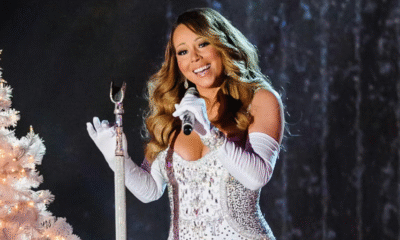Business
Wayne LaPierre and the NRA: A timeline on January 6, 2024 at 7:15 pm Business News | The Hill
The National Rifle Association announced Friday that longtime chief Wayne LaPierre will resign at the end of the month, marking the end of an era as the group continues to face legal and financial trouble.
Long-maligned by gun control activists and constantly controversial, LaPierre has served as the group’s face in Washington for over three decades.
Rise to power
LaPierre is not generally the type of person one would expect to head a gun-rights organization. He grew up in Roanoke, Va., in a home without firearms, and didn’t purchase his first gun until he was out of college.
Bouncing around between political jobs in Virginia and Massachusetts Democratic circles — once turning down a job from then-Speaker of the House Tip O’Neil (D-Mass.) — LaPierre joined the NRA lobbying team in 1978.
In his 2021 critical history of the organization, journalist Tim Mak described LaPierre as “bookish” and an “awkward egghead type.”
But, he was considered extremely effective by colleagues and quickly rose in the group’s ranks. In just a few years, he was promoted to lead the NRA’s state lobbying arm and then its federal lobbying effort.
“This organization was sliding into … an abyss when he took over, and he stabilized it and turned it around and started building it,” former NRA President Marion Hammer said in a 1995 Los Angeles Times feature.
Known for social awkwardness, lackluster fashion sense and a reputation for being a push-over, Mak described, LaPierre nonetheless found success winning over Washington politicians to his gun-rights cause.
He took the CEO job in 1991 with reluctance, only after no other candidate stepped up. Even in the 1995 LA Times feature he showed little confidence in his own job, joking that the NRA board would be quick to have him removed.
It was an open secret that LaPierre didn’t even enjoy shooting guns, Mak wrote, once showing up to a skeet shoot with an embarrassingly rusted shotgun, and years later being so clumsy with gun safety that his weapon was confiscated during a video filming.
“He represents a real departure for the NRA,” author Osha Gray Davidson, who wrote a 1993 book on the history of the organization, told the LA Times. “He’s the first leader for the NRA that doesn’t come from the shooting-sports and hunting area. He’s a politician.”
A video leaked to The New Yorker in 2021 showed LaPierre on an African trophy hunt, attempting to take down an elephant. After nervously felling the elephant, he went on to miss a killing blow three times and was chastised by his guide.
“Wayne would be spotted far more often with his legal pads than with a pistol,” Mak wrote. “He looks at guns through the lens of politics — as a political junkie, not as a lover of firearms.”
Kingmaker
His early years at the helm of the NRA were marked with internal strife and legislative difficulties. The first hurdle was the 1991 Brady Bill, named for the press secretary who was paralyzed during an assassination attempt on President Reagan.
It mandated federal background checks on gun purchases for the first time, and faced fierce opposition from the NRA. While it did pass, the group won a concession, doing away with the proposed five-day waiting period to purchase a weapon and instead opting for an instant background check.
Then came the 1994 Assault Weapons Ban, a landmark bill that threatened to severely hamper gun enthusiasts. But with NRA support, a sunset clause was added to the weapon ban portion of the 1994 crime bill, which expired in 2004. Two decades later, there is little political will to re-implement it, despite efforts from Democrats.
Through scandals of spending and controversies of policy surrounding ever-more-frequent school shootings, the NRA reached its height in the 2000s and 2010s.
LaPierre was the head of arguably the most powerful lobby in Washington, and wielded that power to force the hands of dozens of politicians on gun policy. Through a militant membership and hefty political donations, the NRA could sink a candidate by endorsing a rival.
The group also spent hundreds of millions on legal cases, challenging gun control measures in nearly every state.
Fading empire
Cracks began to show in the late 2010s and into this decade. As former President Trump took center stage of GOP politics, less attention was paid to the gun lobby. While the NRA was still successful in pursuing legal cases, its influence was no longer what it was.
Membership started to drop, and with it fundraising.
The association lost about a half-million members from 2021-22, according to gun violence news nonprofit The Trace. It raised just $213 million in 2022, about half of its 2016 total, according to the nonprofit Citizens for Responsibility and Ethics in Washington.
That came at the same time legal bills rose. New York Attorney General Letitia James (D) filed a suit against the NRA in 2021, alleging that LaPierre and other executives corruptly spent millions of association funds on personal luxuries.
That included Caribbean vacations, private jet trips, fancy dinners and even LaPierre’s penchant for gourmet ice cream.
Following an 18-month investigation, James said the NRA fostered “a culture of self-dealing, mismanagement and negligent oversight,” costing the group $64 million over three years. She sought to dissolve the whole organization in the suit, but a state judge pared back that demand last year.
Resignation
LaPierre’s resignation announcement came just three days before the New York case is set to go to trial. He remains a defendant in the case, and has denied wrongdoing.
His resignation was somewhat unexpected, but the 74-year-old chief cited heath reasons for his departure.
In the interim, the NRA will be led by long-time executive and Head of General Operations Andrew Arulanandam, the group announced Friday.
LaPierre now has the opportunity to go through with a retirement plan he laid out for the LA Times in 1995 and has reportedly frequently repeated to friends since: to start an ice cream shop in northern Maine.
Business, News, NRA The National Rifle Association announced Friday that longtime chief Wayne LaPierre will resign at the end of the month, marking the end of an era as the group continues to face legal and financial trouble. Long-maligned by gun control activists and constantly controversial, LaPierre has served as the group’s face in Washington for over three…
Business
Google Accused Of Favoring White, Asian Staff As It Reaches $28 Million Deal That Excludes Black Workers

Google has tentatively agreed to a $28 million settlement in a California class‑action lawsuit alleging that white and Asian employees were routinely paid more and placed on faster career tracks than colleagues from other racial and ethnic backgrounds.
- A Santa Clara County Superior Court judge has granted preliminary approval, calling the deal “fair” and noting that it could cover more than 6,600 current and former Google workers employed in the state between 2018 and 2024.

How The Discrimination Claims Emerged
The lawsuit was brought by former Google employee Ana Cantu, who identifies as Mexican and racially Indigenous and worked in people operations and cloud departments for about seven years. Cantu alleges that despite strong performance, she remained stuck at the same level while white and Asian colleagues doing similar work received higher pay, higher “levels,” and more frequent promotions.
Cantu’s complaint claims that Latino, Indigenous, Native American, Native Hawaiian, Pacific Islander, and Alaska Native employees were systematically underpaid compared with white and Asian coworkers performing substantially similar roles. The suit also says employees who raised concerns about pay and leveling saw raises and promotions withheld, reinforcing what plaintiffs describe as a two‑tiered system inside the company.
Why Black Employees Were Left Out
Cantu’s legal team ultimately agreed to narrow the class to employees whose race and ethnicity were “most closely aligned” with hers, a condition that cleared the path to the current settlement.

The judge noted that Black employees were explicitly excluded from the settlement class after negotiations, meaning they will not share in the $28 million payout even though they were named in earlier versions of the case. Separate litigation on behalf of Black Google employees alleging racial bias in pay and promotions remains pending, leaving their claims to be resolved in a different forum.
What The Settlement Provides
Of the $28 million total, about $20.4 million is expected to be distributed to eligible class members after legal fees and penalties are deducted. Eligible workers include those in California who self‑identified as Hispanic, Latinx, Indigenous, Native American, American Indian, Native Hawaiian, Pacific Islander, and/or Alaska Native during the covered period.
Beyond cash payments, Google has also agreed to take steps aimed at addressing the alleged disparities, including reviewing pay and leveling practices for racial and ethnic gaps. The settlement still needs final court approval at a hearing scheduled for later this year, and affected employees will have a chance to opt out or object before any money is distributed.
H2: Google’s Response And The Broader Stakes
A Google spokesperson has said the company disputes the allegations but chose to settle in order to move forward, while reiterating its public commitment to fair pay, hiring, and advancement for all employees. The company has emphasized ongoing internal audits and equity initiatives, though plaintiffs argue those efforts did not prevent or correct the disparities outlined in the lawsuit.
For many observers, the exclusion of Black workers from the settlement highlights the legal and strategic complexities of class‑action discrimination cases, especially in large, diverse workplaces. The outcome of the remaining lawsuit brought on behalf of Black employees, alongside this $28 million deal, will help define how one of the world’s most powerful tech companies is held accountable for alleged racial inequities in pay and promotion.
Business
Luana Lopes Lara: How a 29‑Year‑Old Became the Youngest Self‑Made Woman Billionaire

At just 29, Luana Lopes Lara has taken a title that usually belongs to pop stars and consumer‑app founders.
Multiple business outlets now recognize her as the world’s youngest self‑made woman billionaire, after her company Kalshi hit an 11 billion dollar valuation in a new funding round.
That round, a 1 billion dollar Series E led by Paradigm with Sequoia Capital, Andreessen Horowitz, CapitalG and others participating, instantly pushed both co‑founders into the three‑comma club. Estimates place Luana’s personal stake at roughly 12 percent of Kalshi, valuing her net worth at about 1.3 billion dollars—wealth tied directly to equity she helped create rather than inheritance.

Kalshi itself is a big part of why her ascent matters.
Founded in 2019, the New York–based company runs a federally regulated prediction‑market exchange where users trade yes‑or‑no contracts on real‑world events, from inflation reports to elections and sports outcomes.
As of late 2025, the platform has reached around 50 billion dollars in annualized trading volume, a thousand‑fold jump from roughly 300 million the year before, according to figures cited in TechCrunch and other financial press. That hyper‑growth convinced investors that event contracts are more than a niche curiosity, and it is this conviction—expressed in billions of dollars of new capital—that turned Luana’s share of Kalshi into a billion‑dollar fortune almost overnight.
Her path to that point is unusually demanding even by founder standards. Luana grew up in Brazil and trained at the Bolshoi Theater School’s Brazilian campus, where reports say she spent up to 13 hours a day in class and rehearsal, competing for places in a program that accepts fewer than 3 percent of applicants. After a stint dancing professionally in Austria, she pivoted into academics, enrolling at the Massachusetts Institute of Technology to study computer science and mathematics and later completing a master’s in engineering.
During summers she interned at major firms including Bridgewater Associates and Citadel, gaining a front‑row view of how global macro traders constantly bet on future events—but without a simple, regulated way for ordinary people to do the same.

That realization shaped Kalshi’s founding thesis and ultimately her billionaire status. Together with co‑founder Tarek Mansour, whom she met at MIT, Luana spent years persuading lawyers and U.S. regulators that a fully legal event‑trading exchange could exist under commodities law. Reports say more than 60 law firms turned them down before one agreed to help, and the company then spent roughly three years in licensing discussions with the Commodity Futures Trading Commission before gaining approval. The payoff is visible in 2025’s numbers: an 11‑billion‑dollar valuation, a 1‑billion‑dollar fresh capital injection, and a founder’s stake that makes Luana Lopes Lara not just a compelling story but a data point in how fast wealth can now be created at the intersection of finance, regulation, and software.
Business
Harvard Grads Jobless? How AI & Ghost Jobs Broke Hiring

America’s job market is facing an unprecedented crisis—and nowhere is this more painfully obvious than at Harvard, the world’s gold standard for elite education. A stunning 25% of Harvard’s MBA class of 2025 remains unemployed months after graduation, the highest rate recorded in university history. The Ivy League dream has become a harsh wakeup call, and it’s sending shockwaves across the professional landscape.

Jobless at the Top: Why Graduates Can’t Find Work
For decades, a Harvard diploma was considered a golden ticket. Now, graduates send out hundreds of résumés, often from their parents’ homes, only to get ghosted or auto-rejected by machines. Only 30% of all 2025 graduates nationally have found full-time work in their field, and nearly half feel unprepared for the workforce. “Go to college, get a good job“—that promise is slipping away, even for the smartest and most driven.
Tech’s Iron Grip: ATS and AI Gatekeepers
Applicant tracking systems (ATS) and AI algorithms have become ruthless gatekeepers. If a résumé doesn’t perfectly match the keywords or formatting demanded by the bots, it never reaches human eyes. The age of human connection is gone—now, you’re just a data point to be sorted and discarded.
AI screening has gone beyond basic qualifications. New tools “read” for inferred personality and tone, rejecting candidates for reasons they never see. Worse, up to half of online job listings may be fake—created simply to collect résumés, pad company metrics, or fulfill compliance without ever intending to fill the role.
The Experience Trap: Entry-Level Jobs Require Years
It’s not just Harvard grads who are hurting. Entry-level roles demand years of experience, unpaid internships, and portfolios that resemble a seasoned professional, not a fresh graduate. A bachelor’s degree, once the key to entry, is now just the price of admission. Overqualified candidates compete for underpaid jobs, often just to survive.
One Harvard MBA described applying to 1,000 jobs with no results. Companies, inundated by applications, are now so selective that only those who precisely “game the system” have a shot. This has fundamentally flipped the hiring pyramid: enormous demand for experience, shrinking chances for new entrants, and a brutal gauntlet for anyone not perfectly groomed by internships and coaching.
Burnout Before Day One
The cost is more than financial—mental health and optimism are collapsing among the newest generation of workers. Many come out of elite programs and immediately end up in jobs that don’t require degrees, or take positions far below their qualifications just to pay the bills. There’s a sense of burnout before careers even begin, trapping talent in a cycle of exhaustion, frustration, and disillusionment.
Cultural Collapse: From Relationships to Algorithms
What’s really broken? The culture of hiring itself. Companies have traded trust, mentorship, and relationships for metrics, optimizations, and cost-cutting. Managers no longer hire on potential—they rely on machines, rankings, and personality tests that filter out individuality and reward those who play the algorithmic game best.
AI has automated the very entry-level work that used to build careers—research, drafting, and analysis—and erased the first rung of the professional ladder for thousands of new graduates. The result is a workforce filled with people who know how to pass tests, not necessarily solve problems or drive innovation.
The Ghost Job Phenomenon
Up to half of all listings for entry-level jobs may be “ghost jobs”—positions posted online for optics, compliance, or future needs, but never intended for real hiring. This means millions of job seekers spend hours on applications destined for digital purgatory, further fueling exhaustion and cynicism.
Not Lazy—Just Locked Out
Despite the headlines, the new class of unemployed graduates is not lazy or entitled—they are overqualified, underleveraged, and battered by a broken process. Harvard’s brand means less to AI and ATS systems than the right keyword or résumé format. Human judgment has been sidelined; individuality is filtered out.

What’s Next? Back to Human Connection
Unless companies rediscover the value of human potential, mentorship, and relationships, the job search will remain a brutal numbers game—one that even the “best and brightest” struggle to win. The current system doesn’t just hurt workers—it holds companies back from hiring bold, creative talent who don’t fit perfect digital boxes.
Key Facts:
- 25% of Harvard MBAs unemployed, highest on record
- Only 30% of 2025 grads nationwide have jobs in their field
- Nearly half of grads feel unprepared for real work
- Up to 50% of entry-level listings are “ghost jobs”
- AI and ATS have replaced human judgment at most companies
If you’ve felt this struggle—or see it happening around you—share your story in the comments. And make sure to subscribe for more deep dives on the reality of today’s economy and job market.
This is not just a Harvard problem. It’s a sign that America’s job engine is running on empty, and it’s time to reboot—before another generation is locked out.

 Entertainment4 weeks ago
Entertainment4 weeks agoColombia’s ‘Doll’ Arrest: Police Say a 23-Year-Old Orchestrated Hits, Including Her Ex’s Murder

 Entertainment4 weeks ago
Entertainment4 weeks agoHow The Grinch Became The Richest Christmas Movie Ever

 Entertainment4 weeks ago
Entertainment4 weeks agoMiley Cyrus Is Engaged to Maxx Morando

 Film Industry3 weeks ago
Film Industry3 weeks agoDisney Brings Beloved Characters to ChatGPT After $1 Billion OpenAI Deal

 Business4 weeks ago
Business4 weeks agoLuana Lopes Lara: How a 29‑Year‑Old Became the Youngest Self‑Made Woman Billionaire

 Entertainment4 weeks ago
Entertainment4 weeks agoMariah Carey’s One Holiday Hit Pays her $3.3 Million a Year

 Film Industry3 weeks ago
Film Industry3 weeks agoNetflix Got Outbid: Paramount Drops a $108 Billion Cash Bomb on Warner Bros.

 Entertainment4 weeks ago
Entertainment4 weeks agoAnne Hathaway Just Turned Her Instagram Bio Into a 2026 Release Calendar





























